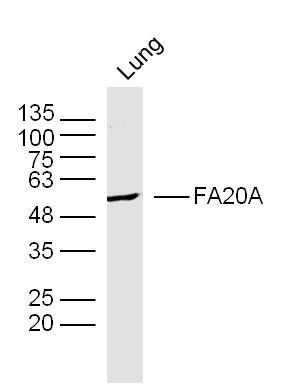产品货号 : mlR13619
英文名称 : FA20A
中文名称 : FA20A抗体
别 名 : FA20A_HUMAN; Protein FAM20A.
研究领域 : 细胞生物 干细胞 细胞分化
抗体来源 : Rabbit
克隆类型 : Polyclonal
交叉反应 : Human, Mouse, Rat, Rabbit,
产品应用 : WB=1:500-2000 ELISA=1:500-1000 IHC-P=1:400-800 IHC-F=1:400-800 ICC=1:100-500 IF=1:100-500 (石蜡切片需做抗原修复)
not yet tested in other applications.
optimal dilutions/concentrations should be determined by the end user.
分 子 量 : 57kDa
细胞定位 : 细胞浆
性 状 : Lyophilized or Liquid
浓 度 : 1mg/ml
免 疫 原 : KLH conjugated synthetic peptide derived from human FA20A:101-200/541
亚 型 : IgG
纯化方法 : affinity purified by Protein A
储 存 液 : 0.01M TBS(pH7.4) with 1% BSA, 0.03% Proclin300 and 50% Glycerol.
保存条件 : Store at -20 °C for one year. Avoid repeated freeze/thaw cycles. The lyophilized antibody is stable at room temperature for at least one month and for greater than a year when kept at -20°C. When reconstituted in sterile pH 7.4 0.01M PBS or diluent of antibody the antibody is stable for at least two weeks at 2-4 °C.
PubMed : PubMed
产品介绍 : FA20A belongs to the FAM20 family. All FAM20 proteins contain putative conserved signal sequences as well as a conserved C terminal domain. FA20A is a secreted glycoprotein. It has been found in EML and MPRO cell lines, with low levels in undifferentiated cells. FA20A is induced during maturation to promyelocyte stage of neutrophil differentiation and decreased during neutrophil terminal differentiation.
Subcellular Location:
Secreted
Tissue Specificity:
Highly expressed in lung and liver. Intermediate levels in thymus and ovary.
Post-translational modifications:
N-glycosylated (By similarity).
DISEASE:
Amelogenesis imperfecta and gingival fibromatosis syndrome (AIGFS) [MIM:614253]: An autosomal recessive condition characterized by mild gingival fibromatosis and dental anomalies, including hypoplastic amelogenesis imperfecta, intrapulpal calcifications, delay of tooth eruption, hypodontia/oligodontia, pericoronal radiolucencies, and unerupted teeth. Note=The disease is caused by mutations affecting the gene represented in this entry.
Similarity:
Belongs to the FAM20 family.
SWISS:
Q96MK3
Gene ID:
54757
Important Note:
This product as supplied is intended for research use only, not for use in human, therapeutic or diagnostic applications.
产品图片












